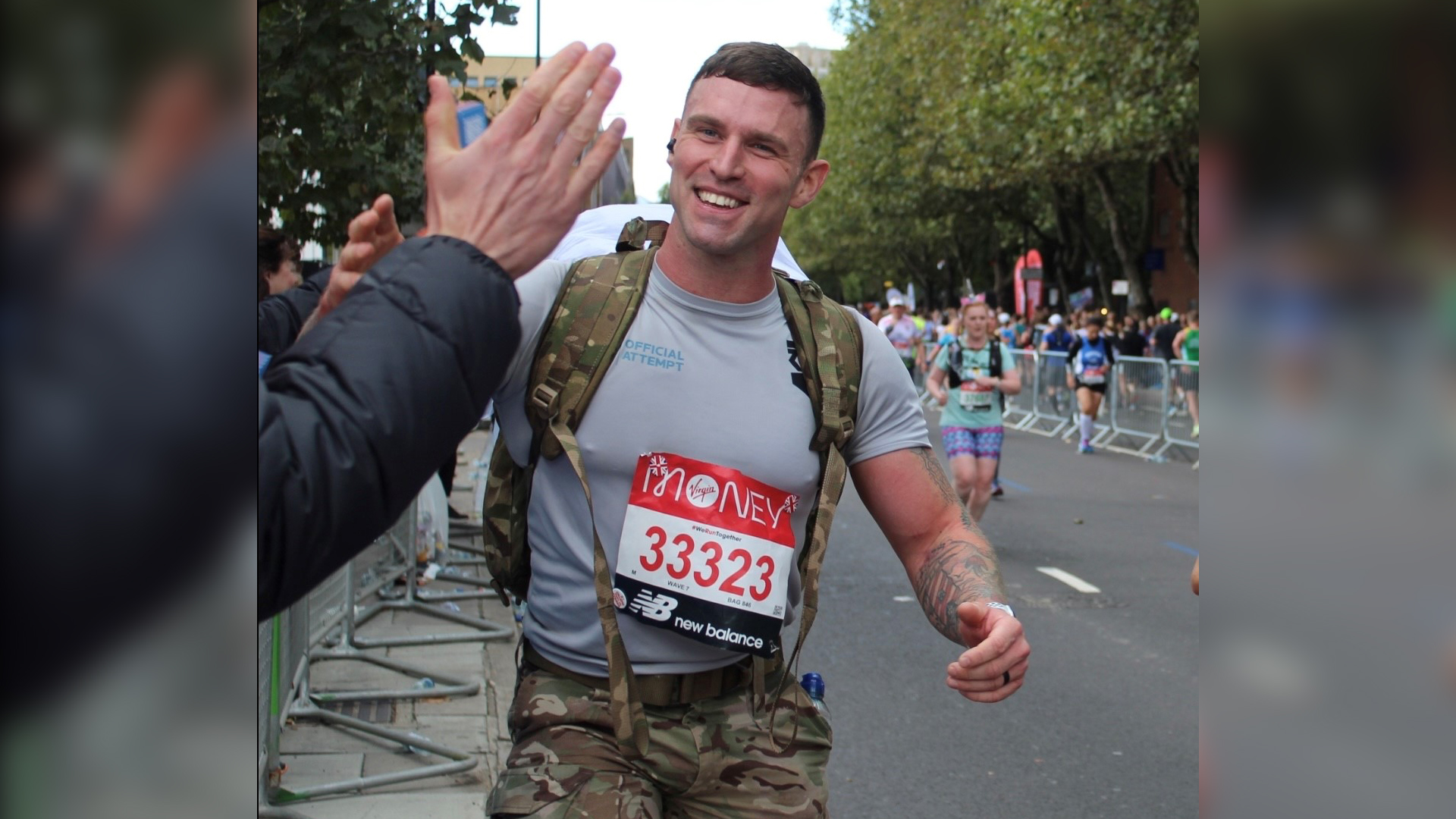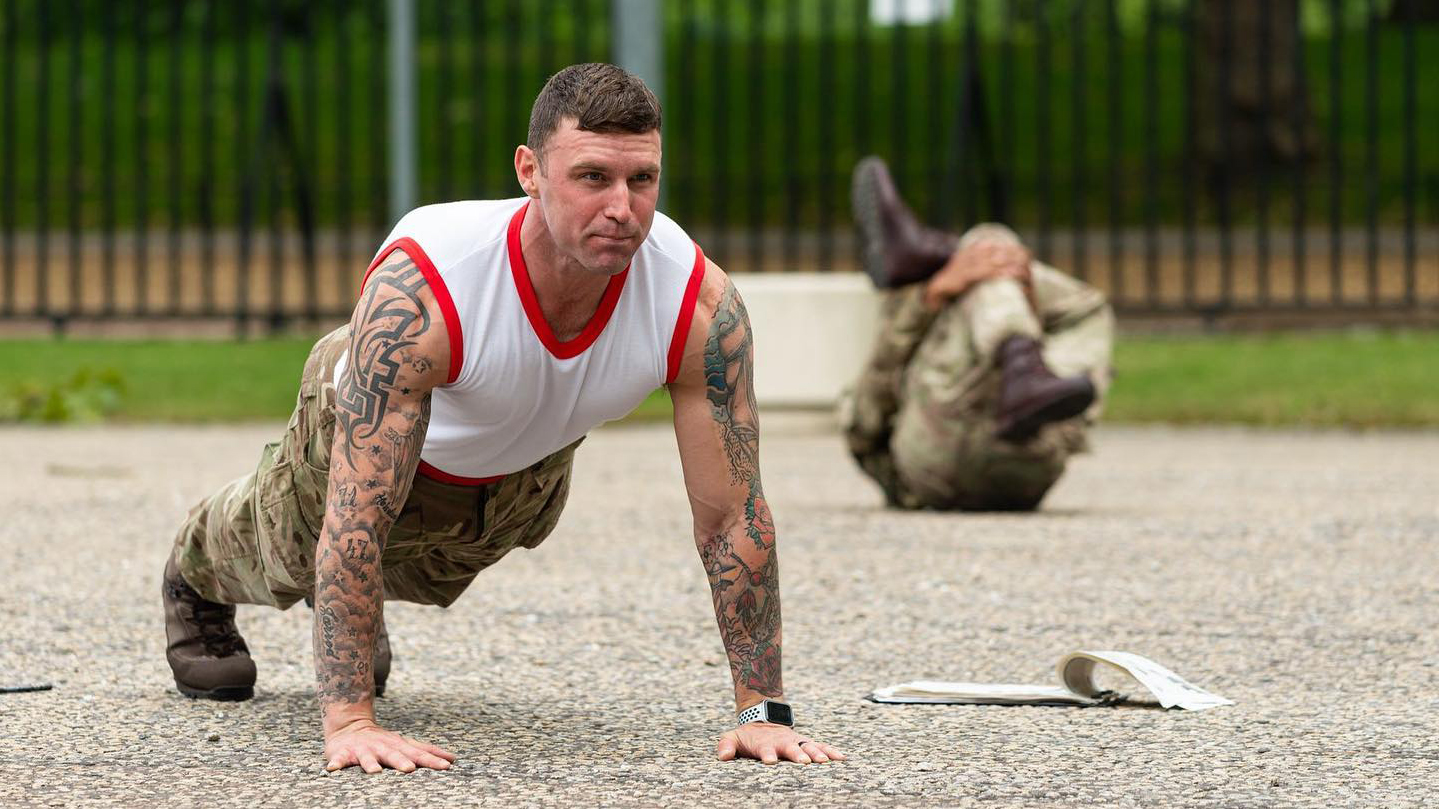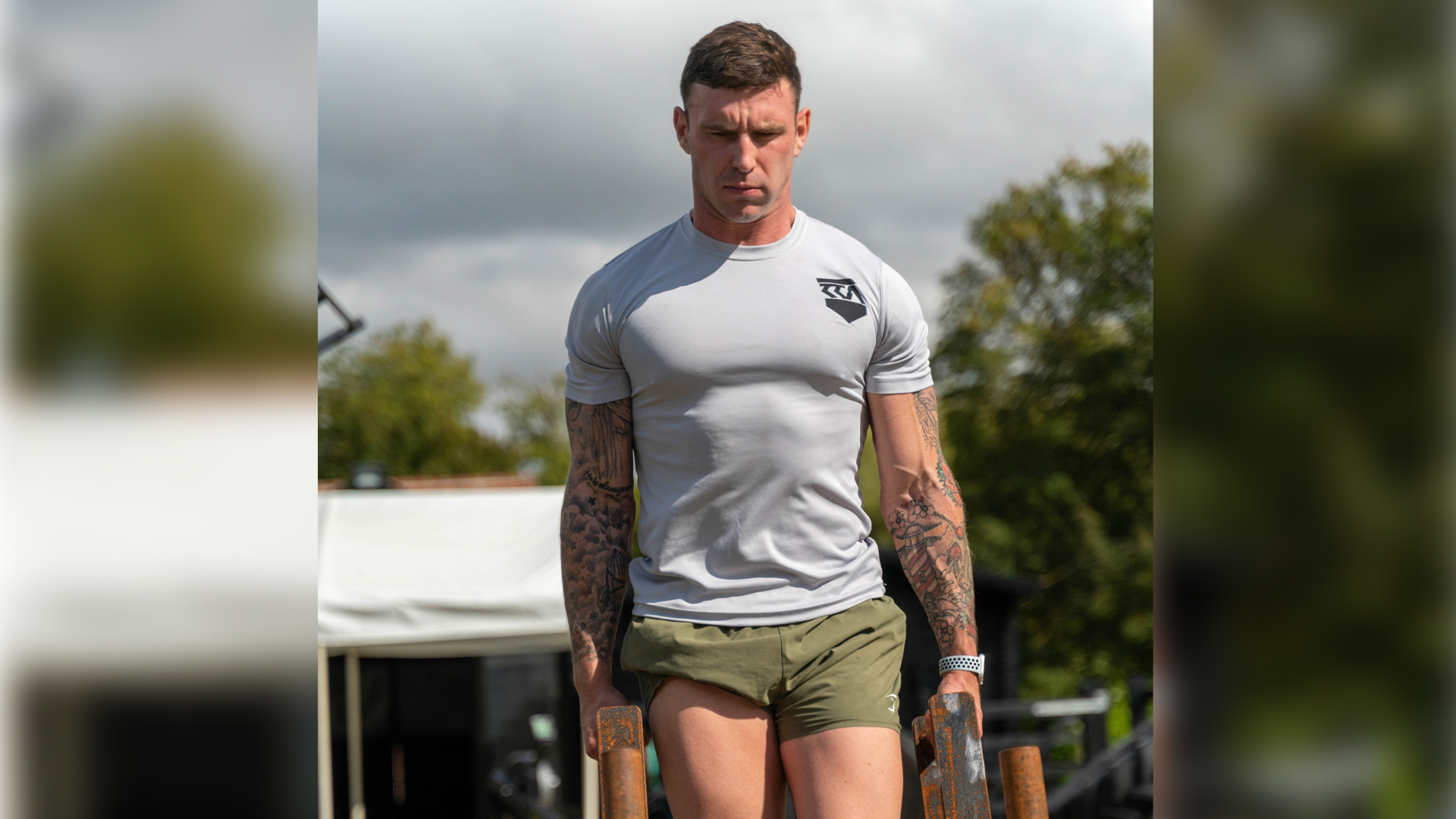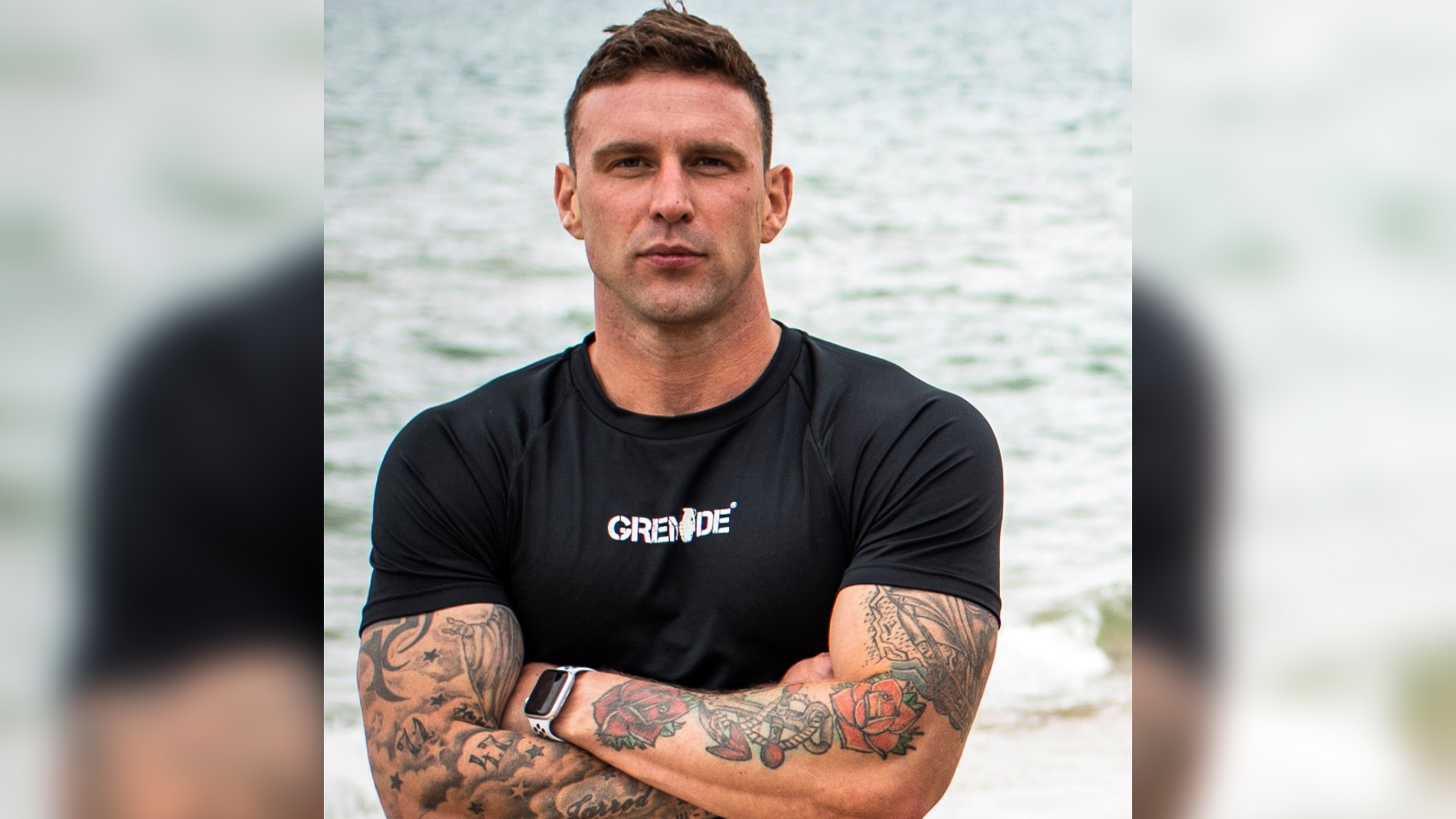

Farren Morgan sounds somewhat tired on the phone, which is entirely understandable a day after running the London Marathon in full military gear wearing a 34-kilo backpack. He not only ran the marathon but did it in a world record time, in six hours and 50 minutes, and is just waiting for his certificate to arrive.
“I want it to inspire the military community as well as the wider community to make people realise that you can do anything if you put your mind to it”, he says, “I also wanted to make sure that I pushed myself out of my comfort zone. There's not a lot of things that push my fitness levels at this point.”
And I can see why. Farren is a section commander of the British Army, a member of the Coldstream Guards – the oldest regiment in the British Army – and served with the Guards Parachute Platoon for two years. In order to get in, Farren had to undergo the notoriously difficult P company training to earn his Maroon beret and British Military jump wings.
He is also a PT, both inside and outside the army, has his own military-style fitness programme called the Tactical Athlete and is a Grenade ambassador too. It’s easy to see why he had to make a Guinness World Record attempt just to get out of his comfort zone.
- Step it up: Study reveals the number of steps you have to walk a day to avoid premature death
- Fit over 40: fitness experts recommend exercise, diet and recovery tips for Millennials
“I'm not gonna lie, every single minute was uncomfortable”
It wasn’t easy, though. Carrying a 34 kg backpack for 26.2 miles puts a lot of pressure on people physically and mentally. “I'm not gonna lie, every single minute was uncomfortable”, Farren explains, “I'm going to go as far as saying this was the hardest thing I've ever done mentally and physically.”
It’s said that you win endurance races with your head, not with your legs. Things will get uncomfortable, and you have to be ready for hitting the wall, which will inevitably come sooner or later. “If you've got any kind of niggles on your body or different thoughts in your brain, everything gets enhanced a thousand-fold”, Farren says.
That said, things were going swimmingly at the beginning of the marathon. “The first six miles were pretty easy, it went quite a fast as I was really excited. Once you're settled into a pace, it's time to start thinking about your strategy”, he says.
Sign up to the T3 newsletter for smarter living straight to your inbox
Get all the latest news, reviews, deals and buying guides on gorgeous tech, home and active products from the T3 experts
Some issues arose around the 9-mile mark. “I strained my hamstring at mile nine”, Farren admits, “but I powered through and used the warrior mentality to work through the pain. I wouldn't advise people to push themselves for another 17 miles after they feel a little bit of an injury, but that was the decision I made to take on that day.”
One thing that certainly helped was the support from his friends and family members. “30-40 people came to see me on the day, including my wife, who provided great support and even went to three different places to cheer me on during the race.”

“I did around a thousand miles of weighted runs”
Training for such an attempt is not a walk in the park either. “Over the six months of training before the race, I'd say I did around a thousand miles of weighted runs as well as following my own Tactical Athlete Coaching programme”, Farren goes on, “This includes a running session, three strength conditioning sessions and a tactical session each week.”
This is on top of his usual training load. “Normally, if I wasn't training for the marathon, I do PT for the military guys in the morning. I might even jump on that session with them if it's a run or a weighted run. Then I'll do my strength session in the afternoon”, he adds.
It’s not just hardcore training, though. “As I age, I put more and more emphasis on flexibility and recovery. “Before COVID, I was doing a lot of hot yoga. I really enjoyed that”, he says, “I use foam roller a lot, and I really enjoy using the Theragun massage guns. They are excellent.” Farren actually carried his Theragun in his bergen during the marathon and used it to open up his calves a bit before the race.
“You have to listen to your body”, he recommends, “If I feel really tired or burnt out because my work/life balance took a hit, my sessions are going to hinder as well.” It’s not uncommon for him to take a day off if he feels low on energy. On these days, he might do some stretching and make sure he hydrates as well. “Hydration is just so important”, he adds.

“I took 4,000 calories a day for the past four weeks”
Runners love to talk about their carb-loading sessions before longer races, but as expected, Farren’s version of this was equally as hardcore as you’d expect. “I took 4,000 calories a day for the past four weeks before the marathon”, he explains, “I put on quite a lot of weight, to be honest. I had pasta with almost every meal I had.”
Needless to say, Farren is not famous for chowing down on carbs every day. As he says, diet is “massively important” in his life and is a “secondary goal” of his. He is into intermittent fasting too: “I'll do my strength session early morning in a fasted state”, he says, “Normally, I have a massive meal in the evening not long before I go to bed. That’s enough to fuel me for the workout session the next morning.”
“I’ve been training for 18 years. I know exactly what my body needs for fuel. I know exactly when my body's telling me to stop when I need to rest. And that's a big point that some people don't realise when they train: when your body's telling you something, you need to listen to that. Otherwise, you can put yourself back further than where you are at the moment.”

Keep on pushing
Farren won’t sit on his laurels, even after his world record event. He will compete at the Hyrox Birmingham event, although a day after the Guinness World Record attempt, this feels a bit much: “I don't want to think about competing at the moment because I feel absolutely drained”, he says with a laugh.
He’s also launching his new Youtube channel, where he will recap his London Marathon experience. I’m sure whatever he plans on doing in the future, Farren’s warrior mentality will help him conquer any obstacles he might encounter. Maybe not with ease, but it wouldn’t be his style anyway.
You can read more about Farren's attempt at Grenade by clicking here.
- Liked this?
- Ivan Alonzo interview: "I lost 100 lbs by not beating myself up over missing a training day or two"
- Daley Thompson interview: "Commitment meant training seven days a week, 350 days a year, five to seven hours a day"
- Miles Nazarie interview: "For me, there are never excuses. If it's 1 AM and you haven't trained, then you go to the 24-hour gym and train"

Matt Kollat is a journalist and content creator who works for T3.com and its magazine counterpart as an Active Editor. His areas of expertise include wearables, drones, fitness equipment, nutrition and outdoor gear. He joined T3 in 2019. His byline appears in several publications, including Techradar and Fit&Well, and more. Matt also collaborated with other content creators (e.g. Garage Gym Reviews) and judged many awards, such as the European Specialist Sports Nutrition Alliance's ESSNawards. When he isn't working out, running or cycling, you'll find him roaming the countryside and trying out new podcasting and content creation equipment.
-
 I tried a Snapdragon feature that's a game-changer for Netflix, Amazon and more
I tried a Snapdragon feature that's a game-changer for Netflix, Amazon and moreMoises Live can isolate and enhance audio in real-time using the Elite X's NPU
By Mike Lowe
-
 Under Armour's new sneaker doesn't play by the old rules
Under Armour's new sneaker doesn't play by the old rulesIf this is the future of the brand, it's off to a running start
By Matt Kollat